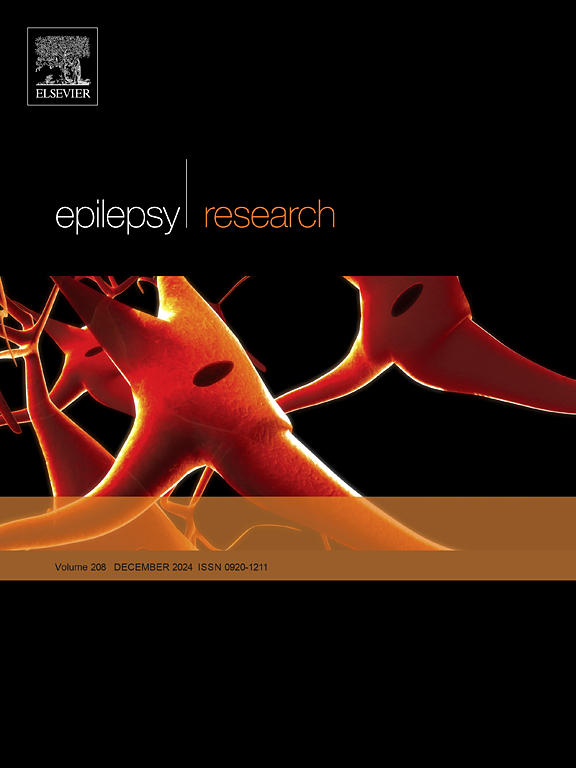Personal impact of epilepsy and well-being in individuals with epilepsy
IF 2
4区 医学
Q3 CLINICAL NEUROLOGY
引用次数: 0
Abstract
Aim
The aim was to examine the personal impact of epilepsy on well-being, and influencing factors in individuals with epilepsy.
Method
This cross-sectional descriptive study was conducted on 138 individuals with epilepsy. Data were collected using the "Descriptive Information Form," the "Personal Impact of Epilepsy Scale (PIES)," and the “World Health Organization-Five Well-Being Index (WHO-5)”. In the statistical analysis, p < 0.05 was considered significant.
Results
The mean age of individuals with epilepsy was 31.22 ± 13.12 years, and the mean duration of epilepsy diagnosis was 9.93 ± 6.84 years. The mean WHO-5 Well-Being Index score was 62.55 ± 26.26 and the mean PIES scale score was 34.27 ± 20.27. According to the regression analysis results, well-being (β = −0.568; p = 0.000) and the duration of epilepsy diagnosis (β = −0.130; p = 0.041) were negative predictors, while the number of seizures (β = 0.209; p = 0.001) and age (β = 0.180; p = 0.010) were positive predictors of PIES. This explained 52.8 % of the total PIES score.
Conclusion
The well-being of individuals with epilepsy was found to be above average, and the personal impact of epilepsy was found to be low. Low well-being of individuals with epilepsy increased the negative impact of epilepsy on the individual. Number of seizures, older age, and the shortness of the diagnosis period negatively affected the individual with epilepsy personally. Health professionals need to focus on the influencing factors of individuals with epilepsy to increase their well-being and reduce the negative effects of epilepsy.
癫痫对癫痫患者的个人影响和福祉
目的研究癫痫对个人健康的影响,以及癫痫患者的影响因素。方法对138例癫痫患者进行横断面描述性研究。使用“描述性信息表”、“癫痫个人影响量表(pie)”和“世界卫生组织五幸福指数(WHO-5)”收集数据。在统计分析中,p <; 0.05被认为是显著的。结果癫痫患者平均年龄为31.22 ± 13.12岁,平均诊断时间为9.93 ± 6.84岁。WHO-5幸福指数平均得分为62.55 ± 26.26,PIES量表平均得分为34.27 ± 20.27。根据回归分析结果,幸福感(β =−0.568;P = 0.000)和癫痫诊断持续时间(β = - 0.130;P = 0.041)为负预测因子,而癫痫发作次数(β = 0.209;P = 0.001)和年龄(β = 0.180;p = 0.010)为PIES的阳性预测因子。这解释了52.8 %的总PIES得分。结论癫痫病人的幸福感处于平均水平以上,癫痫病对个人的影响较低。癫痫患者的低幸福感增加了癫痫对个体的负面影响。癫痫发作次数、年龄和诊断期短对癫痫患者个人有负面影响。卫生专业人员需要关注癫痫患者的影响因素,以提高他们的健康水平,减少癫痫的负面影响。
本文章由计算机程序翻译,如有差异,请以英文原文为准。
求助全文
约1分钟内获得全文
求助全文
来源期刊

Epilepsy Research
医学-临床神经学
CiteScore
0.10
自引率
4.50%
发文量
143
审稿时长
62 days
期刊介绍:
Epilepsy Research provides for publication of high quality articles in both basic and clinical epilepsy research, with a special emphasis on translational research that ultimately relates to epilepsy as a human condition. The journal is intended to provide a forum for reporting the best and most rigorous epilepsy research from all disciplines ranging from biophysics and molecular biology to epidemiological and psychosocial research. As such the journal will publish original papers relevant to epilepsy from any scientific discipline and also studies of a multidisciplinary nature. Clinical and experimental research papers adopting fresh conceptual approaches to the study of epilepsy and its treatment are encouraged. The overriding criteria for publication are novelty, significant clinical or experimental relevance, and interest to a multidisciplinary audience in the broad arena of epilepsy. Review articles focused on any topic of epilepsy research will also be considered, but only if they present an exceptionally clear synthesis of current knowledge and future directions of a research area, based on a critical assessment of the available data or on hypotheses that are likely to stimulate more critical thinking and further advances in an area of epilepsy research.
 求助内容:
求助内容: 应助结果提醒方式:
应助结果提醒方式:


